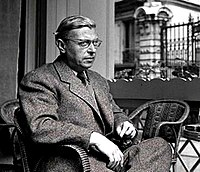Nobel Laureate Jean-Paul Sartre: Conversion of a Militant Atheist
Author/Compiler: Tihomir Dimitrov (http://nobelists.net; also see http://scigod.com/index.php/sgj/issue/view/3)

JEAN-PAUL SARTRE – NOBEL LAUREATE IN LITERATURE
Nobel Prize: Jean-Paul Sartre (1905–1980) won the 1964 Nobel Prize in Literature “for his work which, rich in ideas and filled with the spirit of freedom and the quest for truth, has exerted a far-reaching influence on our age.” Sartre declined the prize.
Nationality: French
Education: Doctorate in Philosophy, Ecole Normale Superieure, France, 1929
Occupation: Professor at Lycee du Havre, Lycee de Laon, Lycee Pasteur de Neuilly-sur-Seine, and Lycee Condorcet; Editor, Les Temps Modernes, Paris, (1944-1980)
1. In his lecture Existentialism Is a Humanism (1946) Sartre described his atheistic existentialism thus:
“Dostoevsky said, ‘If God didn’t exist, everything would be possible!’ That is the very starting point of existentialism. Indeed, everything is permissible if God does not exist, and as a result man is forlorn, because neither within him nor without does he find anything to cling to. He can’t start making excuses for himself. In other words, there is no determinism, man is free, man is freedom.
On the other hand, if God does not exist, we find no values or commands to turn to which legitimize our conduct. So, in the bright realm of values, we have no excuse behind us, nor justification before us. We are alone, with no excuses.” (Sartre 1957, 22-23; see also Sartre 1988, 78).
2. “First of all, man exists, turns up, appears on the scene, and, only afterwards, defines himself. If man, as the existentialist conceives him, is indefinable, it is because at first he is nothing. Only afterward will he be something, and he himself will have made what he will be. Thus, there is no human nature, since there is no God to conceive it.” (Sartre 1957, 15-16; see also Sartre 1988, 75).
3. Nevertheless, Sartre underwent a very surprising change of mind towards the end of his life; in fact, he came very close to theistic commitment. The magazine National Review (June 11, 1982) reported it thus:
“Throughout his mature career, the philosopher Jean-Paul Sartre was a militant atheist. Politically, although he quarreled with Marxist materialism, his rhetoric was often indistinguishable from the most heavy-handed Stalinist boiler-plate.
However, during the philosopher’s last months there were some surprising developments. In 1980, nearing his death, by then blind, decrepit, but still in full possession of his faculties, Sartre came very close to belief in God, perhaps even more than very close.
The story can be told briefly, and perhaps reverently. An ex-Maoist, Pierre Victor, shared much of Sartre’s time toward the end. In the early spring of 1980 the two had a dialogue in the pages of the ultra-gauchiste Nouvel Observateur. It is sufficient to quote a single sentence from what Sartre said then to measure the degree of his acceptance of the grace of God and the creatureliness of man:
‘I do not feel that I am the product of chance, a speck of dust in the universe, but someone who was expected, prepared, prefigured. In short, a being whom only a Creator could put here; and this idea of a creating hand refers to God.’
Students of existentialism, the atheistic branch, will note that in this one sentence Sartre disavowed his entire system, his engagements, his whole life.
- Log in to post comments




Recent comments